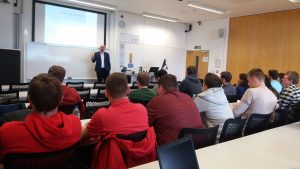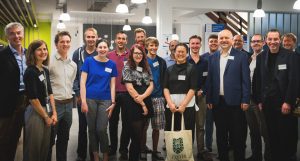
April 2017 marked the start of the new apprenticeship levy. Charged at 0.5% of payroll costs for UK employers with a wage bill of over £3 million, the Levy is part of the government’s commitment to create 3 million new apprenticeships by 2020. This creates new and interesting opportunities for organisations both large and small to recoup their costs or take advantage of government funding by hiring apprentices.
The University of Exeter has responded to this new opportunity with its pioneering BSc Digital and Technology Solutions degree apprenticeship launched in 2016, the BEng Civil Engineering Site Management Degree Apprenticeship launching October 2017 and more programmes on the horizon for 2018.
A 2016 report showed the average UK student finishes their degree with £44,000 of debt, making degree apprenticeships a welcome opportunity for many talented and enterprising students looking to gain a degree without the burden of tuition fees. Through programmes of 4-5 years in duration, apprentices will gain a wealth of professional experience, earn a salary and enhance their lifelong career prospects. For employers, this offers new opportunities to attract high-calibre students while embedding them in the culture of your business, building loyalty and supporting growth.
BSc Digital and Technology Solutions Degree Apprenticeship
This trailblazing programme at the University is benefitting from a mix of students and companies, ranging from BT, IBM, Renishaw and the Met Office to smaller businesses such as Beran Instruments and Aspidistra Software.
“The combination of residential and remote learning, allows our degree apprentices to combine university studies with a real role at IBM. We’re confident they are learning valuable digital skills and look forward to seeing how much they will achieve.” – Charlotte Fisher Morecroft; IBM
The programme is delivered through a unique model of residentials and online study, created in such a way as to minimise the impact on apprentices’ roles in the workplace. Students travel from across the country to the Exeter campus twice a year for several days to kick-start new modules, while the rest of the year is taught through online learning and lectures. Recognising the value of the extensive real-wold experience gained by apprentices, approximately one third of credit towards the degree apprenticeship is assessed through work-based learning.
“As a business we really value the blended learning element of the course which allows our apprentices to take full advantage of the earn as you learn element of an apprenticeship.” – Emma Portman; Renishaw PLC
 Students on the Digital and Technology Solutions programme go through 2 years of core teaching, before taking modules relating to the specialist role-related pathway they are appointed to. They graduate as either a Software Engineer, IT consultant, Business Analyst, Cyber Security Analyst, Data Analyst or Network Engineer.
Students on the Digital and Technology Solutions programme go through 2 years of core teaching, before taking modules relating to the specialist role-related pathway they are appointed to. They graduate as either a Software Engineer, IT consultant, Business Analyst, Cyber Security Analyst, Data Analyst or Network Engineer.
Throughout their course apprentices are assigned a mentor in the organisation and an academic mentor from the University, allowing for close monitoring of their progress, academic and pastoral needs.
“We have found the Apprenticeship Programme to be very well structured, with ample support and information being provided at all stages, resulting in an enhanced learning experience, and enabling us to transfer and implement larger corporate ‘best practice’ within our smaller SME environment.
Our learners have clearly benefited from the excellent working relationships formed with a variety of professional and experienced people, both in terms of other students on the course and lecturers.” – Peter Morrish; Beran Instruments
 The Degree Apprenticeships Team at the University of Exeter
The Degree Apprenticeships Team at the University of Exeter
Large and Small Companies
Companies with a wage bill over £3 million a year pay 0.5% of this (with a £15,000 exemption) into an online account on a monthly basis. They can choose to benefit from this levy by hiring apprentices, in which case the accumulated money will go towards the tuition fees.
Emma Portman, Test and Training Manager at Renishaw, has enjoyed working with the University in recent years:
“Starting an apprenticeship scheme can be a long, complicated process and even though Renishaw has a well-established degree-level software apprenticeship scheme it was with some trepidation that we embarked on our new supplier relationship with the University of Exeter. However, from the very beginning they were engaged, focused and enthusiastic. Our support team ensured that we had all of the information we needed quickly and our first cohort of apprentices joined the Digital and Technology Solutions degree successfully in September 2016.”
Companies not paying the levy can also benefit from this new system, as they will only pay 10% of the tuition fees, while the Government covers the remaining 90%. This provides smaller companies with a great and affordable way to grow their workforce, whether in number or in skill. Based on the BSc Degree Apprenticeship’s tuition fees of £27,000 over 4 years; this means small companies only pay £2,700 (10%); or £675 per year; to hire a new apprentice or to develop an already existing employee.
Beran Instruments, based in North Devon, currently has 1 student on the programme and has decided to hire another apprentice for the September 2017 intake. The company website boasts of their past success in hiring apprentices, some of which have now proceeded to managerial positions.
Peter Morrish, who joined the company in 1990 as an apprentice and is now a key member of the senior management team, cherishes the benefits of the degree apprenticeship on both the company and the student level:
“The Company has enjoyed various benefits from being involved with Exeter University’s Apprenticeship Programme, not least of which has been the significant level of development for the trainees as they have been able to apply theoretical learning to practical work applications from Day 1. The Company also benefits from improved access to a local high quality training provider, resulting in much greater communication and collaboration between the two organisations. The industry-focused modules relate closely to key business requirements.”
Students
The first cohort on the BSc Digital and Technology Solutions Degree Apprenticeship consists of 13 apprentices from 4 employers; while the 2nd intake has benefitted greatly from the initial success and positive feedback, growing to 45 apprentices from 15 employers. The current students on the programme are very positive about the degree apprenticeship and see clear benefits to taking this route of vocational education:

“Being able to learn on the job while also learning at uni is great. As the course has progressed I’ve found that the knowledge is beginning to overlap and is reinforcing my learning on both sides. I’ve also learnt a lot about time management – you have to make sure you keep on top of everything, which at times can be challenging, like with any degree.” – Lucy Spiteri-Beale; Software Degree Apprentice – Renishaw PLC
The result of the degree apprenticeship programme is an experienced graduate, with a skillset moulded specifically to the needs of your business, which has shown to lead to increased loyalty to the company.
 Quinten John joined Beran Instruments as an apprentice in 2011 and is currently on the IT degree apprenticeship at the University of Exeter. He explains how the programme is benefiting both him and the company:
Quinten John joined Beran Instruments as an apprentice in 2011 and is currently on the IT degree apprenticeship at the University of Exeter. He explains how the programme is benefiting both him and the company:
“The flexible programme allows you to attend to work duties whilst learning in parallel, and enables you to specialise and develop particular skills to meet your own individual career aspirations and also the ongoing needs of the business.” Quinten John; Software Degree Apprentice – Beran Instruments
If you would like to explore how a degree apprenticeship can benefit your organisation, please get in touch with Partnership Development Officer Korneel Verhaeghe (01392 72 62 25 or ), who will gladly provide you with information and answer any questions.
“The only thing worse than training your employees and losing them, is not training your employees and keeping them.” – Zig Ziglar